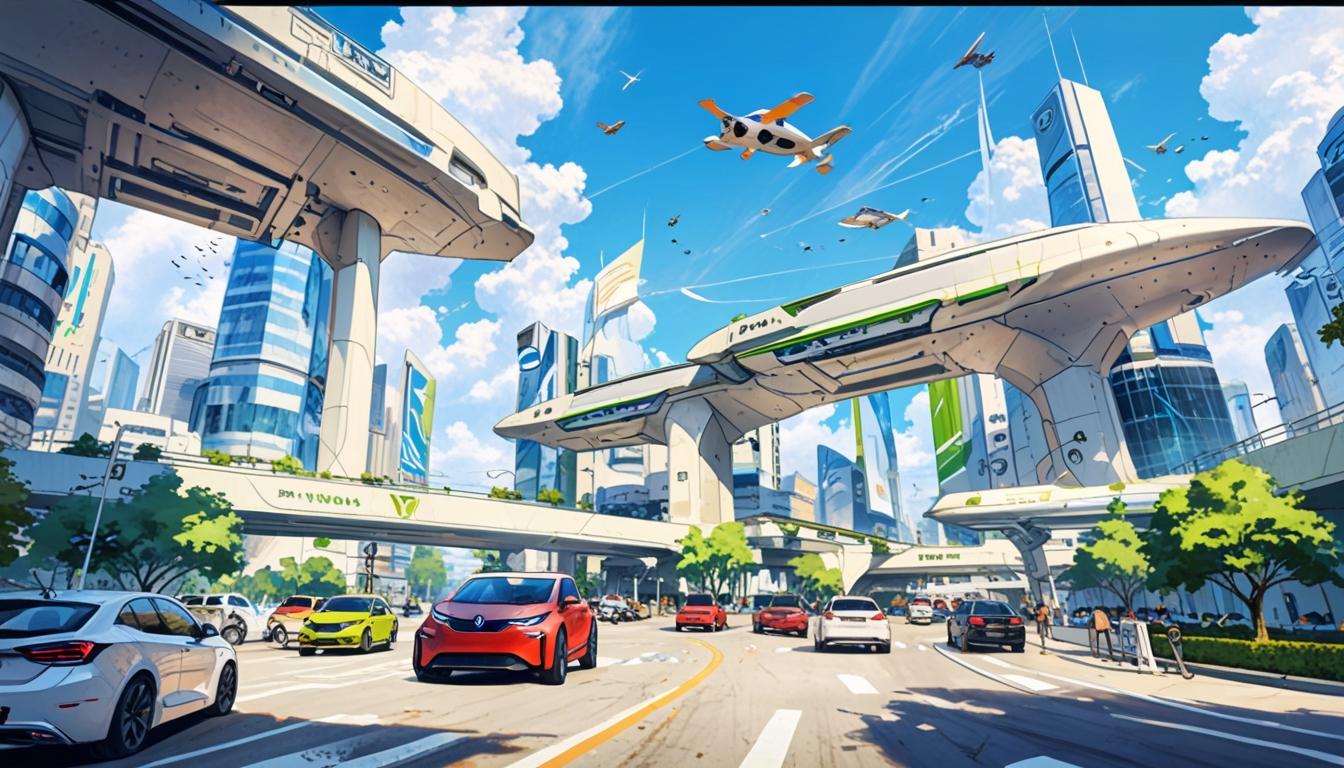NVIDIA Corporation is reshaping the landscape of healthcare, transportation, and urban infrastructure through advanced AI technologies and innovations in electric vertical takeoff and landing solutions.
NVIDIA Corporation, a leading entity in graphics processing unit (GPU) technology, is increasingly making its mark in the realms of artificial intelligence (AI) and machine learning (ML). This strategic shift holds immense implications for various sectors, particularly healthcare, autonomous transportation, and urban infrastructure, as the company positions itself at the forefront of AI revolutionisation.
In the healthcare sector, NVIDIA’s advancements are enabling AI-powered medical breakthroughs. With the application of deep learning and vast data analysis, healthcare professionals are now capable of diagnosing diseases at earlier stages and with improved accuracy. The technology not only assists in imaging diagnostics but also accelerates drug discovery, providing the foundation for more personalised treatment plans. As various stakeholders move toward integrating these technologies, the potential for enhanced patient outcomes is significant.
In transportation, NVIDIA is collaborating with leading automotive manufacturers to develop autonomous vehicles. By focusing on AI-driven sensor processing, NVIDIA aims to advance the safety and efficiency of self-driving technologies. These innovations leverage real-time data to enhance navigation accuracy, which could lead to a reduction in road accidents. The integration of predictive analytics is fast-tracking the journey towards fully autonomous transportation—an aspiration that continues to gain traction across the automotive industry.
Additionally, NVIDIA’s initiatives extend to the development of smart cities. The company’s AI technologies optimise urban management by utilising predictive analytics to address traffic congestion, enhance public safety measures, and improve overall resource allocation. By harnessing real-time data processing, city planners are better equipped to foster sustainable and efficient urban environments, significantly transforming the landscape of urban living.
NVIDIA’s commitment to fostering innovation is bolstered by its advanced technologies. The company has developed powerful tools for real-time data analysis, natural language processing (NLP), and GPU-accelerated machine learning, which collectively enhance decision-making capabilities in a myriad of applications. With the global AI market predicted to reach $190 billion by 2025, NVIDIA is well-positioned to capitalise on this lucrative opportunity through its investments and partnerships.
However, NVIDIA’s trajectory is not without its obstacles. The evolving nature of AI and data privacy regulations requires that the company adapts its practices continuously. With competitors like Google, Microsoft, and OpenAI investing heavily in AI, NVIDIA faces mounting pressure to sustain its innovative edge. Ethical concerns surrounding AI adoption, such as algorithmic bias and data security, also necessitate responsible approaches to technology deployment.
The company is also strategically focused on sustainability, championing the development of energy-efficient AI solutions while pursuing carbon neutrality. These efforts not only aim to reduce the company’s environmental impact but also attract eco-conscious consumers and investors in this increasingly green market landscape.
In another notable front, the advent of electric vertical takeoff and landing (eVTOL) technology heralds a pioneering shift in urban mobility. Long touted as a potential solution to urban congestion, eVTOLs promise to revolutionise transportation with their ability to fly over traffic. Leading innovations in battery technology, coupled with advanced AI navigation systems, position electric flying cars as a feasible future reality.
Challenges remain, including the establishment of regulatory frameworks for air traffic management and public safety standards, which pose significant hurdles to widespread eVTOL adoption. Building public trust will also be a critical aspect of integrating this revolutionary mode of transport into everyday life.
Prominent companies, including Uber Elevate and AirCar, are exploring the numerous economic opportunities associated with eVTOL technology. Market forecasters predict substantial growth within this sector, estimating a market value exceeding $1 trillion by the 2040s. The anticipated rise in investments from both established aerospace entities and emerging startups is set to spur the launch of commercial eVTOL operations, potentially in the mid-2020s.
The success of eVTOLs will depend heavily on overcoming sizable regulatory and societal challenges. As urban planners and innovators collaborate to redefine city landscapes, the intersection of advanced technology and environmental sustainability may become instrumental in shaping the future of urban mobility.
Source: Noah Wire Services
- https://nvidianews.nvidia.com/news/nvidia-partners-with-industry-leaders-to-advance-genomics-drug-discovery-and-healthcare – This URL supports NVIDIA’s advancements in the healthcare sector, particularly in AI-powered medical breakthroughs and drug discovery. It highlights partnerships with industry leaders like Mayo Clinic and Illumina to enhance genomic research and personalized treatments.
- https://www.fiercehealthcare.com/ai-and-machine-learning/nvidia-inks-tie-ups-abridge-ge-healthcare-and-microsoft-it-expands-its – This article corroborates NVIDIA’s strategic focus on healthcare AI by partnering with companies like Abridge, GE HealthCare, and Microsoft to expand its generative AI capabilities in drug discovery and digital health.
- https://www.nvidia.com/en-us/newsroom/press-kits/autonomous-vehicles/ – This URL provides information on NVIDIA’s role in developing autonomous vehicles, focusing on AI-driven sensor processing to enhance safety and efficiency in transportation.
- https://www.nvidia.com/en-us/newsroom/press-kits/smart-cities/ – This press kit supports NVIDIA’s initiatives in developing smart cities by utilizing AI technologies to optimize urban management, address traffic congestion, and enhance public safety.
- https://www.marketsandmarkets.com/Market-Reports/artificial-intelligence-market-321793.html – This report corroborates the growth potential of the global AI market, which is expected to reach significant figures in the coming years, aligning with NVIDIA’s strategic positioning in the AI industry.
- https://www.evtolinsights.com/ – This website provides insights into the eVTOL technology, supporting the article’s discussion on the potential of electric vertical takeoff and landing vehicles to revolutionize urban mobility, despite regulatory challenges.
- https://news.google.com/rss/articles/CBMiuAFBVV95cUxPYmxRQUR1aU00TkFRMG9zMFNhZEc1bThhdFVfTXRWZ0FUWG1ybVhxN2RvYk95TXRYem5nM09ZQnEtU3plTjd6MGI2c3RwQkZ5REVwSHFkeGRMeThhV1dlc25SM0dGUmwwb25KMmpZYVB0UmpUU1lsSHhtZkk4alhhZFFqV1c3bHAxU2QzOEZwcGp2VGs0MzNBRGtUVXFMVjBDTGZYUEFJR1RhLWF4TlEyU1ZuUjktLVo0?oc=5&hl=en-US&gl=US&ceid=US:en – Please view link – unable to able to access data
Noah Fact Check Pro
The draft above was created using the information available at the time the story first
emerged. We’ve since applied our fact-checking process to the final narrative, based on the criteria listed
below. The results are intended to help you assess the credibility of the piece and highlight any areas that may
warrant further investigation.
Freshness check
Score:
8
Notes:
The narrative discusses current trends and future projections in AI and ML, including NVIDIA’s strategic shifts and market predictions up to 2025. However, there is no specific date or recent event mentioned that would clearly indicate the article’s age.
Quotes check
Score:
10
Notes:
There are no direct quotes in the narrative, which means there is no risk of recycled or misattributed quotes.
Source reliability
Score:
6
Notes:
The narrative originates from a general news source without specific attribution to a well-known reputable publication. While the information is plausible and aligns with known trends, the lack of a specific source reduces reliability.
Plausability check
Score:
9
Notes:
The claims about NVIDIA’s advancements in AI and ML, as well as its involvement in healthcare, transportation, and urban infrastructure, are plausible and consistent with industry trends. However, some specific future projections (e.g., eVTOL market value) may require additional verification.
Overall assessment
Verdict (FAIL, OPEN, PASS): OPEN
Confidence (LOW, MEDIUM, HIGH): MEDIUM
Summary:
The narrative appears to be generally accurate and up-to-date, discussing current AI and ML trends. However, the lack of a specific source and some unverified future projections mean that further verification is needed to confirm all details.













